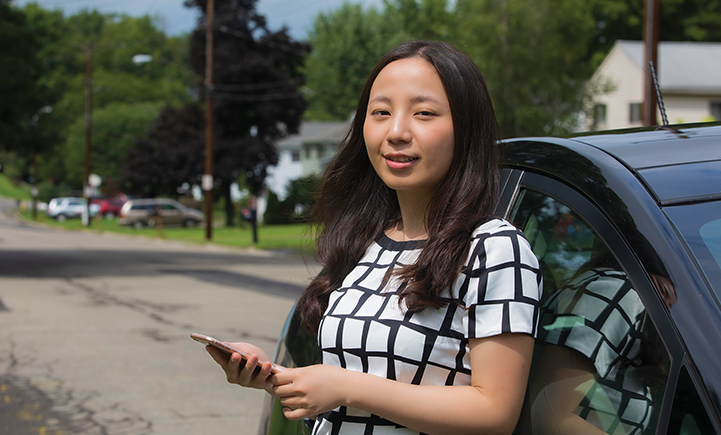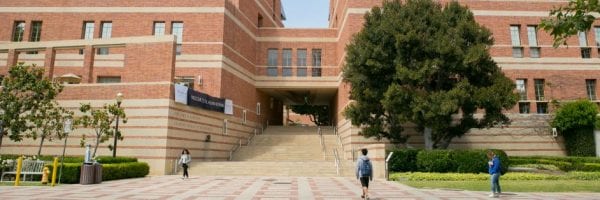New Bill Could Help International MBAs Maintain U.S. Residency

There is a ray of hope shining through the recent clouds of uncertainty of post-MBA residency (and access to work visas) in the U.S.
UVA, Oxford, CEIBS Rise in All-New Financial Times 2019 Ranking

The latest Financial Times MBA ranking is officially out, with several international schools rising closer and closer to the top in 2019.
Harvard Talks Managing Disorganized Employees, and More – Boston News

Let’s explore some of the most interesting stories that have emerged from Boston business schools this week.
How to Manage Someone Who Is Totally Disorganized – Harvard Business Review
Disorganized employees can be wellsprings of frustration, but there are ways to help them better understand how disorderly tendencies impact others.
Harvard Business School‘s Rebecca Knight recently discussed strategies in HBR, addressing root behavior causes and ultimately develop better systems to manage workloads.
“’Is this person’s approach creating negative outcomes, or is it just a style difference?’ If your report indicates ‘disorganized but otherwise reliable, you may have to back off.'”
Rosie Perez (not the actor), Lead Financial Officer of Global Consumer Business Planning and Analytics at American Express, adds, “It takes a lot of time to change ingrained behavior, but it can be addressed. Most importantly, as leaders, it is our job to help coach our colleagues [with] constructive and pointed feedback.”
You can read more about the research here.
Bye-Bye Ivory Tower: Innovation Needs an Ecosystem to Thrive by Tracy Mayor – MIT Sloan Ideas Made to Matter
Innovation is not exclusively indigenous to Silicon Valley. We continue to see exciting developments in London, Tel Aviv, New York, Boston, China, Nigeria, Ghana, and South Africa. However, despite the benefits of globalization, the world of innovation is not wholly flat.
New MIT Sloan research has determined that there are geographic hotspots, or “innovation ecosystems,” where ideas move more easily from inception to impact.
Phil Budden, a Senior Lecturer Specializing in Innovation and Entrepreneurship, notes how the traditional “triple helix” that has long driven innovation—university, government, and corporations—is now joined by two additional players: entrepreneurs and risk capital.
“It’s so important to have innovation-driven entrepreneurs involved. They’re producing the companies of the future. You can’t just have today’s companies [in an ecosystem], you need to have those leaders who are going to produce future companies.”
Fiona Murray, Associate Dean for Innovation, urges corporations to take advantage of startups and entrepreneurs to help experiment on their behalf.
“What these startups tend to do very well is define, order, and test their assumptions through a series of what we call ‘innovation loops. So, one of the benefits of going from a purely internal research and development process to working externally is that you can really rely on the universities and startups in an ecosystem to do that experimentation for you.”
You can read more about global innovation here and watch the recent discussion below.
Joy Field Garners Top Award from Decision Sciences Institute by William Bole – Carroll School News
BC Carroll School of Management Associate Professor of Operations Management Joy Field has received the highest honor bestowed by the Decision Sciences Institute (DSI), a global society of more than 1,800 scholars dedicated to fostering knowledge for better managerial decisions.
Field was named the 2018 co-recipient of the Dennis E. Grawoig Distinguished Service Award, named for a founder of the 50-year-old Institute. The other recipient was Morgan Swink of Texas Christian University.
DSI President Johnny Rungtusanatham of Ohio State University asserts, “This is a highly competitive distinction awarded to those who have made a continual impact on the Institute and the disciplines it serves.”
Field reflected on her two decades of involvement with the Institute. “DSI has been a major contributor to all aspects of my professional development—publishing, teaching, and service—and I am delighted to have been chosen to receive this award from among the many colleagues who have also contributed so much to DSI.”
Find out more about the recent award here.
Work Friends May Not Get Better Benefits, According to UCLA – LA News

As we fully unroll into the new year, we take a look at some of the biggest recent news coming out of Los Angeles.
UCLA Anderson Professor on Work Friendships’ Effects – UCLA Anderson News
Research by Eugene Caruso, Associate Professor of Management and Organizations at UCLA Anderson School of Management, recently received note in the online forum Quartz at Work.
Caruso, along with colleagues from the University of Chicago and Hebrew University, studied the consequences of friendships between managers and employees. Through a series of experiments, the team discovered that when a boss makes a decision, such as who gets a bonus, they are actually less likely to give it to a friend in order to appear impartial. This tendency remained much of the time even when the friend was the more highly deserving candidate for the bonus.
Notably, when managers had to make a decision on a bonus that would remain private, they were more likely to choose the deserving friend. Participants in the research were told that the friend had performed only slightly better than the other bonus candidate, and that the choices were to give the friend the merit-based bonus or to flip a coin to decide between the two. In the public decision scenario, the deserving friend received the bonus 27 percent of the time. When the deserving worker was the non-friend, participants granted the bonus over 60 percent of the time.
The research overall revealed that participants were more likely to approve of the merit-based bonuses. The study can serve as an important model for HR managers on the unintended outcomes of workplace relationships.
Read more about the team’s research here.
Mihaylo Professors on China Trade War and the SoCal Economy – Mihaylo News
Associate Professor of Economics Pedro Amaral and Lecturer Aaron Popp of Cal State Fullerton’s Mihaylo College of Business have examined the impact of the U.S. and China Trade War upon one of the most influential economies, that of Southern California. The region serves as a hub of trade with East Asia.

Cal State Fullerton professor Pedro Amaral
In the panel discussion last month sponsored by the CSUF Economic Association, Amaral and Popp presented their research.
“About 46 percent of total Chinese imports are being tariffed, but L.A. is serving a smaller percentage of those products [that are being tariffed]–41 percent. But any later round of tariffs will have a harder impact on the local economy,” Popp notes.
Reflecting upon the long history of the tension between the two world powers and the nature of China’s transition, Amaral says, “China has had an incomplete transition into capitalism, which the West still ponders about China …We used to think that once they got into free trade, they would become a freer society upon the embrace of the market economy. But they haven’t, which is something my liberal mind struggles with.”
You can read more on Popp and Amaral’s discussion here.
Graziadio Strategy Professor on Corporate Boards and Entrepreneurship – Graziadio News
Dr. Mark Tribbit, Pepperdine Graziadio Assistant Professor of Strategy, was honored recently for his scholarly research with the 2018 Emerald Literati Award. For the past 25 years, the award has acknowledged valuable contributions to scholarly research.
Tribbit’s research, “An Agency Perspective on the Board of Directors and Corporate Entrepreneurship,” examined the effect of takeovers upon internal entrepreneurship. The outcome of the research will help corporate boards to foster entrepreneurial efforts by staff.

Dr. Mark Tribbit, Pepperdine Graziadio Assistant Professor of Strategy / Photo via newsroom.pepperdine.edu
In addition to his professorship, Tribbit serves as the Academic Director of Graziadio’s full-time MBA program. Experienced in management for corporate, retail banking, and wholesale, Dr. Tribbit received his MBA from Villanova University, and his Ph.D. in strategic management from Drexel University.
You can read more about Dr. Tribbit’s award and his full article here.
Wage Transparency, Rideshare Payouts, and More – New York News

Let’s explore some of the most interesting stories that have emerged from New York business schools this week.
Wage Transparency Works: Reduces Gender Pay Gap by 7 Percent – Columbia Business School
New joint-research from members of the Columbia Business School, INSEAD, the University of Copenhagen, University of North Carolina Kenan-Flagler Business School, and Cornell’s SC Johnson College of Business finds that wage transparency can help close the gender pay gap
Columbia’s Daniel Wolfenzon and his co-authors examined the effect of a 2006 requirement for Danish companies to report on gender pay gaps.
“What surprised us the most was the way in which this wage gap closed. Women’s wages did not increase at a faster rate in treatment firms as we were expecting. Instead, we find that men’s wages in treatment firms grew slower relative to men’s wages in control firms. As a result, the total wage bill grew slower in firms that were required to report wage segregated statistics,” Wolfenzon says.
“What is interesting is that the law has unintended consequences on women’s ability to climb up the corporate ladder and their willingness to join the labor market. When firms adopt fairer wage practices towards women, this can have positive effects on women’s labor market outcomes that go well beyond pay gaps,” UNC Kenan-Flagler Assistant Professor of Finance Elena Simintzi says.
You can learn more about the wage transparency research here.
Market-Driven Drivers: Dynamic Payout Ratio Means More Money, Less Wait – Binghamton School of Management
With the rise of on-demand services from ridesharing, we have become accustomed to getting what we want, when we want it. Binghamton University School of Management Assistant Professor of Supply Chain Management Jiaru Bai knows the secret to discovering how to handle impatient customers: data.

“Having a dynamic payout ratio almost always performs better than a fixed payout ratio, according to our model and data analysis,” says Binghamton Assistant Professor Jiaru Bai / Photo via Jonathan Cohen
Bai and her fellow researchers analyzed rides from Didi, China’s largest on-demand ride-hailing service platform. They found that the optimal solution is to flexibly determine the payout percentage, rather than adhere to a rigid, fixed rate.
“Basically, when demand is high, providers should get paid a higher percentage, and when demand is low, providers should get paid a lower percentage. Having a dynamic payout ratio almost always performs better than a fixed payout ratio, according to our model and data analysis, and it leads to benefits for all involved,” Bai says.
You can read more about the ridesharing research here.
New Research Shows U.S. Consumers Prefer Brands that Support Refugees – NYU Stern Experience News & Events
According to a new report titled “How Helping Refugees Helps Brands” from the NYU Stern School of Business and the Tent Partnership for Refugees, American consumers are more likely to purchase from brands that support refugees. This includes brands that hire refugees, deliver services to refugees, invest in refugee entrepreneurs, and source from refugee businesses.
“This report shows that consumers will reward brands that support refugees,” says Gideon Maltz, Executive Director of the Tent Partnership for Refugees.
“In a crowded marketplace, brands that integrate refugees into their business can distinguish themselves from their competitors, especially among millennials. This is a clear demonstration that brands can do well by doing good.”
The Tent Partnership for Refugees, founded by Chobani’s Hamdi Ulukaya, is mobilizing the private sector to improve the lives and livelihoods of more than 25 million refugees. Ulukaya launched Tent with the hope that the private sector is uniquely positioned to address the global refugee crisis, mobilizing networks, resources, innovation, and the entrepreneurial spirit of the business community. There are over 100 companies in the Tent Partnership supporting refugees across 34 countries, which can be found here.
Professor Tülin Erdem, co-author of the report and chair of NYU Stern’s Marketing Department adds, “It impacts brand image and consumer brand purchase behavior positively.’
“This is consistent with current consumer (especially the millennial consumer) preferences for brands that take a strong stance for social issues and consider the welfare on multiple stakeholders, including the society at large.”
The full report can be accessed online. For more, check out the recent NYU Stern article here.
Embracing Diversity at UCLA Anderson, Graziadio’s Commencement, and More – LA News

Friday, ya’ll.
Let’s dig into the biggest stories coming out of Los Angeles this week.
UCLA Anderson’s Hosts Annual Diversity Conference – UCLA Anderson News
UCLA Anderson recently hosted its annual Embracing Diversity Conference. The co-VP for diversity of the Anderson Admissions Ambassador Corps, Denice Gonzales-Kim, discussed her involvement with drawing minority applicants to Anderson in a recent blog post.
“As a first-generation graduate student,” she says, “I take great pride in participating in UCLA Anderson’s annual Embracing Diversity conference. I was reminded why, when deciding which business school to attend, many people gauge the school’s culture by its level of diversity.”

Previous attendees at the UCLA Embracing Diversity Conference / Photo via anderson.ucla.edu
Acknowledging the “embarrassingly low” numbers of diverse b-school students across the country, Gonzales-Kim expressed confidence in the efforts of the Anderson admissions committee to change this. The school draws applicants from a wide variety of socioeconomic groups, genders, orientations, and ethnicity, due in no small part to the efforts of Gonzales-Kim and others in the Ambassador Corps.
Assistant Dean of MBA Admissions and Financial Aid, Alex Lawrence, outlined the takeaways from the Conference – discovery of the school’s intellectual capital, understanding of the Anderson community which is “diverse from all angles”, and realizing the global reach of the Anderson MBA.
You can learn more about Anderson’s diversity efforts and the recent conference here.
Pepperdine Graziadio Honors Distinguished Alumni at Fall Commencement – Graziadio Newsroom
Pepperdine Graziadio held its fall 2018 Commencement Ceremony on December 8, 2018 at the Malibu campus’ Firestone Fieldhouse.
This year, the event honored Vincent J. Monteparte (MBA ’01) with a Distinguished Alumnus Award. Monteparte is a partner at Sway Ventures, a venture capital firm specializing in tech. From a background in aerospace and defense consulting, he pivoted to business operations, software development, and more.
Nicholas Brown, the event’s student speaker, shared his experience as an Air Force veteran. While serving, Brown served as an intercontinental ballistic missile crew commander. He currently serves as an instructor in the Air Force Weapons school, where he implements his core skills as a leader and problem solver that he has gained as an MBA student.
Gary Toebben, former President and CEO of the LA Chamber of Commerce, spoke about his experiences in generating business growth for one of the country’s largest economies. In his final two years, Toebben helped to generate $150 billion for such initiatives as transit improvements, municipal services, and housing for the homeless. He also helped to fund the nine colleges within the Los Angeles Community College District, and was a leader in implementing the LAX Master Plan.
You can read more about the commencement honorees and the rest of the recent event here.
USC Marshall’s Speaker Series Hosts Former Assistant Secretary of State – USC Marshall News
In an interview with Dick Drobnick, USC Marshall IBEAR MBA Program Director, former Assistant Secretary of State Danny Russel discusses, among other things, his experiences with diplomacy. Russel served under John Kerry, and also served in the State Department into the early months of President Donald Trump’s administration.

Former Assistant Secretary of State Danny Russel sits down with USC Marshall’s IBEAR MBA Program Director Dick Drobnick, discussing his roles under Donald Trump, John Kerry, the trade war with China, and much more / Photo via marshall.usc.edu
On the current trade war with China, Russel views that this is the “new abnormal.” Strategic rivalries, he believes, are better dealt with through diplomatic efforts than with the restrictions currently at play in the Trump administration.
Among the other issues the interview covered were cybersecurity and the dynamics of authoritarian regimes. You can listen to the interview and learn more about the IBEAR MBA speaker series here.
